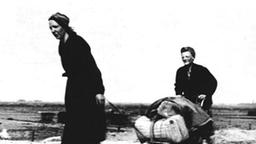Human relationships also have a lasting influence on the epigenome and thus on one’s life and health. For example, a baby who receives too little love and security will not only have bonding issues problems, but also biologically demonstrable disorders in its stress hormone system.
“Trauma not only leaves scars on one’s soul but also on one’s genotype”, adds the depression researcher, Florian Holsboer, when talking about epigenetic marks. If these scars are also present in the genome of the germ cells, it has been proven that they are also passed on to the offspring.
Autorin: Franziska Badenschier
http://www.planet-wissen.de/natur/forschung/epigenetik/
Epigenetic marks can be inherited

Hungerwinter 1944/1945 in Holland
(Taken from an article written by Martin Thurau; “The marks that mold us” published in insightLMU; Issue 1 2014. Information from: Heinrich Leonhardt, Professor of Human Biology at LMU.)
A good example of epigenetic memory is that of pregnant Dutch women who suffered the winters months of the 1944/45 Dutch famine. The fact that the women gave birth to underweight babies seems plausible. But then it turned out that the offspring often suffered from depression, overweight, or schizophrenia. The children suffered from old-age illnesses like heart problems and diabetes at an amazingly early age.
Finally, it turned out that the affected women also gave birth to relatively small children, although the famine had long ended and the women had had access to abundant food and relatively fewer hardships. The hereditary substance of the grandchildren also contained information about the living conditions of the grandparents.

